Analysis of the Global Business Environment and CSR Practices
VerifiedAdded on 2021/02/20
|6
|1490
|24
Report
AI Summary
This report delves into the evolving landscape of the global business environment, emphasizing the critical role of Corporate Social Responsibility (CSR) in contemporary business practices. It analyzes the impact of technological advancements, increased competition, and economic, political, and ecological changes on business operations. The report underscores the significance of ethical conduct, responsible management, and sustainable practices in navigating the complexities of the global market. It highlights the importance of balancing social welfare with economic growth, considering cultural values, and addressing environmental concerns. The study provides examples of companies like Coca-Cola and Toyota to illustrate the benefits of CSR initiatives in enhancing brand image, gaining competitive advantage, and fostering long-term stakeholder relationships. Ultimately, the report concludes that businesses must embrace CSR to remain accountable to society, the economy, and the environment, thereby ensuring their sustained success.
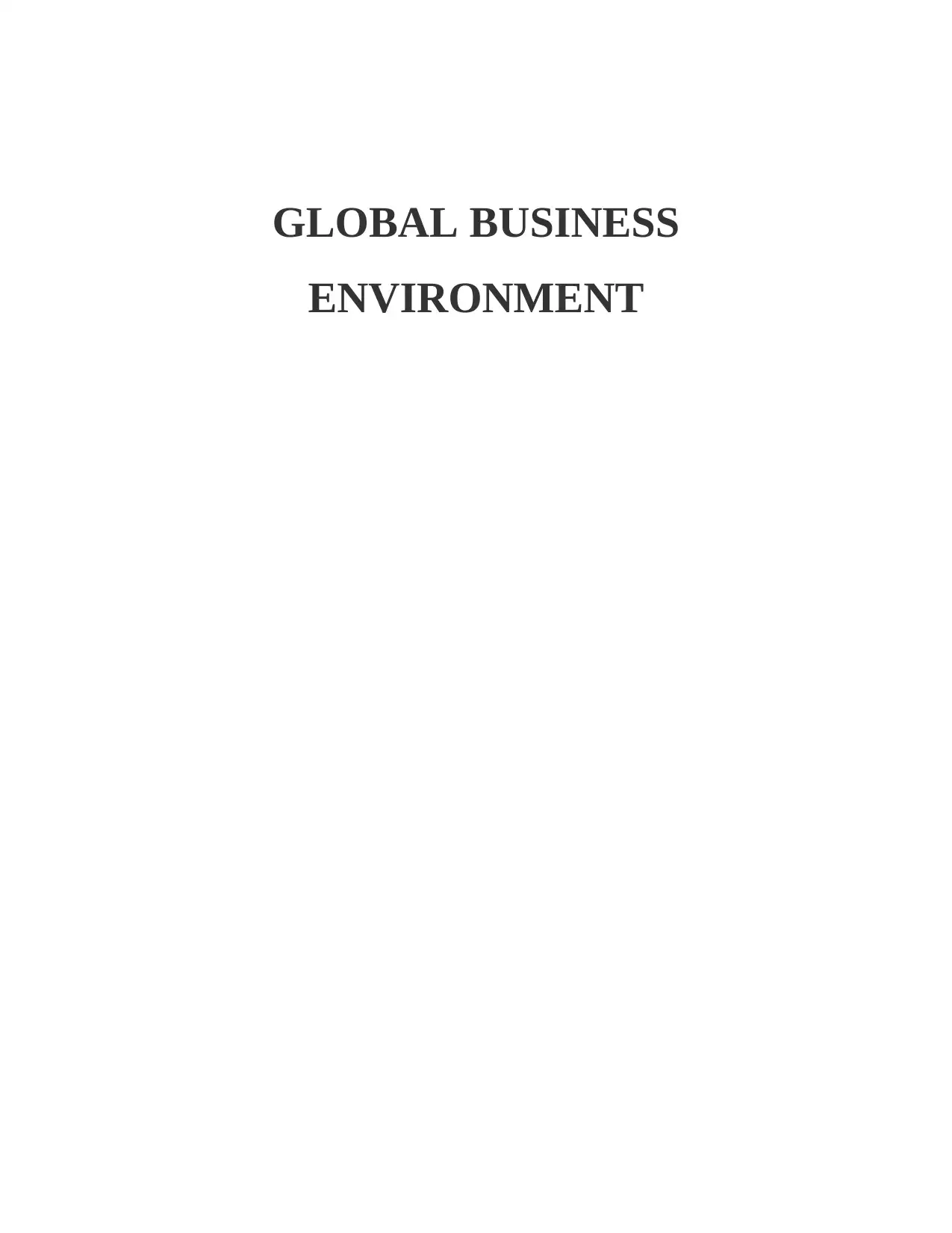
GLOBAL BUSINESS
ENVIRONMENT
ENVIRONMENT
Paraphrase This Document
Need a fresh take? Get an instant paraphrase of this document with our AI Paraphraser
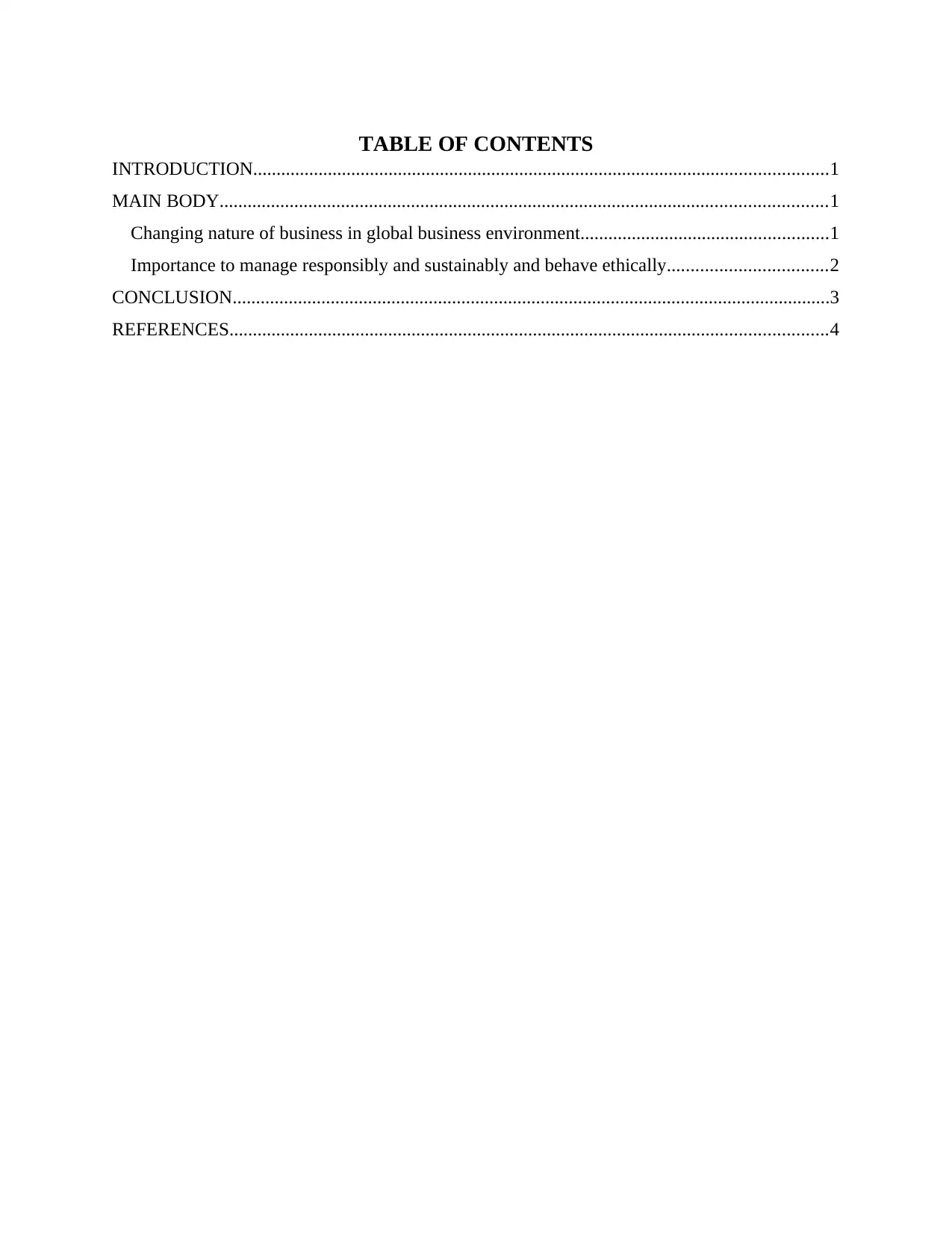
TABLE OF CONTENTS
INTRODUCTION...........................................................................................................................1
MAIN BODY..................................................................................................................................1
Changing nature of business in global business environment.....................................................1
Importance to manage responsibly and sustainably and behave ethically..................................2
CONCLUSION................................................................................................................................3
REFERENCES................................................................................................................................4
INTRODUCTION...........................................................................................................................1
MAIN BODY..................................................................................................................................1
Changing nature of business in global business environment.....................................................1
Importance to manage responsibly and sustainably and behave ethically..................................2
CONCLUSION................................................................................................................................3
REFERENCES................................................................................................................................4
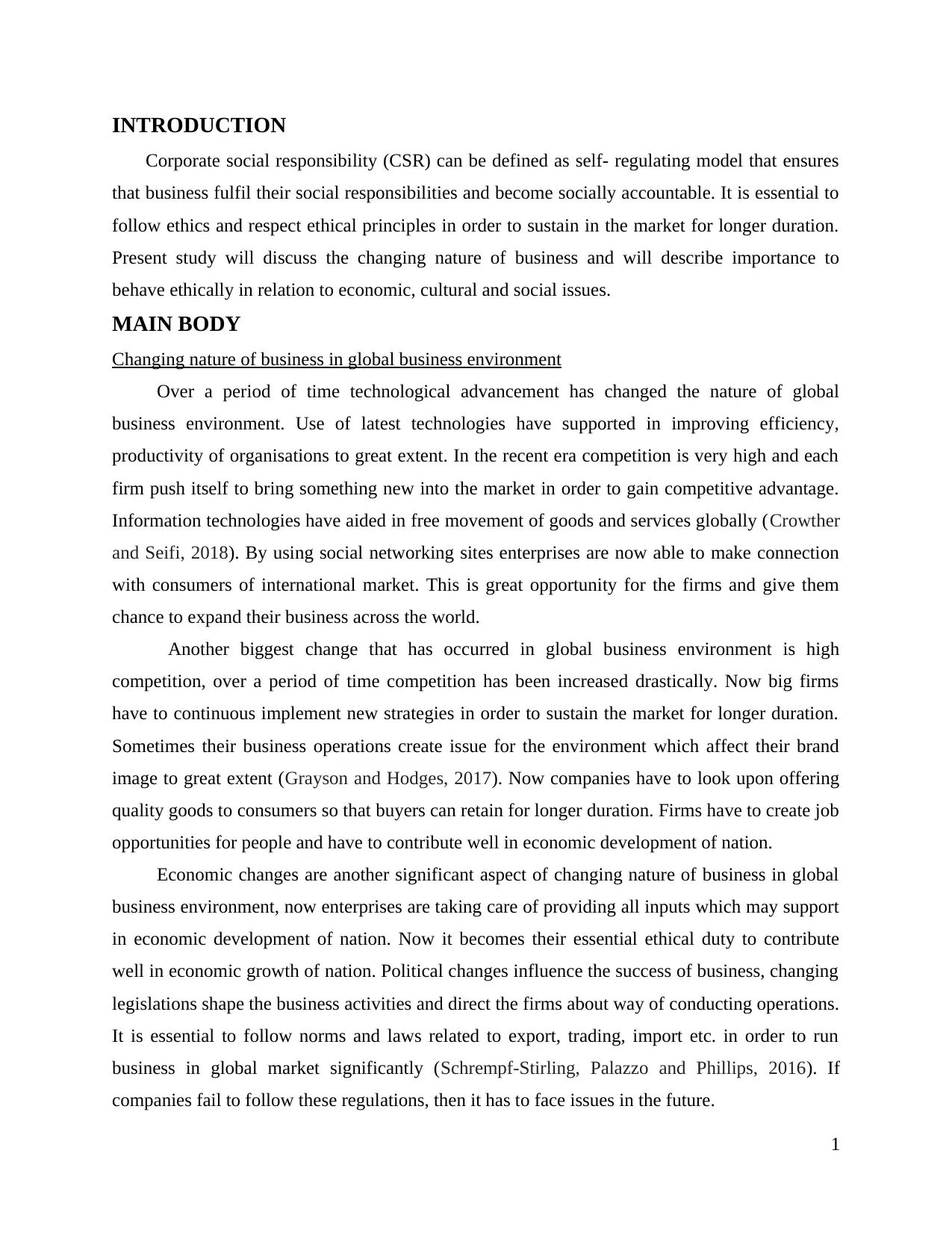
INTRODUCTION
Corporate social responsibility (CSR) can be defined as self- regulating model that ensures
that business fulfil their social responsibilities and become socially accountable. It is essential to
follow ethics and respect ethical principles in order to sustain in the market for longer duration.
Present study will discuss the changing nature of business and will describe importance to
behave ethically in relation to economic, cultural and social issues.
MAIN BODY
Changing nature of business in global business environment
Over a period of time technological advancement has changed the nature of global
business environment. Use of latest technologies have supported in improving efficiency,
productivity of organisations to great extent. In the recent era competition is very high and each
firm push itself to bring something new into the market in order to gain competitive advantage.
Information technologies have aided in free movement of goods and services globally (Crowther
and Seifi, 2018). By using social networking sites enterprises are now able to make connection
with consumers of international market. This is great opportunity for the firms and give them
chance to expand their business across the world.
Another biggest change that has occurred in global business environment is high
competition, over a period of time competition has been increased drastically. Now big firms
have to continuous implement new strategies in order to sustain the market for longer duration.
Sometimes their business operations create issue for the environment which affect their brand
image to great extent (Grayson and Hodges, 2017). Now companies have to look upon offering
quality goods to consumers so that buyers can retain for longer duration. Firms have to create job
opportunities for people and have to contribute well in economic development of nation.
Economic changes are another significant aspect of changing nature of business in global
business environment, now enterprises are taking care of providing all inputs which may support
in economic development of nation. Now it becomes their essential ethical duty to contribute
well in economic growth of nation. Political changes influence the success of business, changing
legislations shape the business activities and direct the firms about way of conducting operations.
It is essential to follow norms and laws related to export, trading, import etc. in order to run
business in global market significantly (Schrempf-Stirling, Palazzo and Phillips, 2016). If
companies fail to follow these regulations, then it has to face issues in the future.
1
Corporate social responsibility (CSR) can be defined as self- regulating model that ensures
that business fulfil their social responsibilities and become socially accountable. It is essential to
follow ethics and respect ethical principles in order to sustain in the market for longer duration.
Present study will discuss the changing nature of business and will describe importance to
behave ethically in relation to economic, cultural and social issues.
MAIN BODY
Changing nature of business in global business environment
Over a period of time technological advancement has changed the nature of global
business environment. Use of latest technologies have supported in improving efficiency,
productivity of organisations to great extent. In the recent era competition is very high and each
firm push itself to bring something new into the market in order to gain competitive advantage.
Information technologies have aided in free movement of goods and services globally (Crowther
and Seifi, 2018). By using social networking sites enterprises are now able to make connection
with consumers of international market. This is great opportunity for the firms and give them
chance to expand their business across the world.
Another biggest change that has occurred in global business environment is high
competition, over a period of time competition has been increased drastically. Now big firms
have to continuous implement new strategies in order to sustain the market for longer duration.
Sometimes their business operations create issue for the environment which affect their brand
image to great extent (Grayson and Hodges, 2017). Now companies have to look upon offering
quality goods to consumers so that buyers can retain for longer duration. Firms have to create job
opportunities for people and have to contribute well in economic development of nation.
Economic changes are another significant aspect of changing nature of business in global
business environment, now enterprises are taking care of providing all inputs which may support
in economic development of nation. Now it becomes their essential ethical duty to contribute
well in economic growth of nation. Political changes influence the success of business, changing
legislations shape the business activities and direct the firms about way of conducting operations.
It is essential to follow norms and laws related to export, trading, import etc. in order to run
business in global market significantly (Schrempf-Stirling, Palazzo and Phillips, 2016). If
companies fail to follow these regulations, then it has to face issues in the future.
1
⊘ This is a preview!⊘
Do you want full access?
Subscribe today to unlock all pages.

Trusted by 1+ million students worldwide
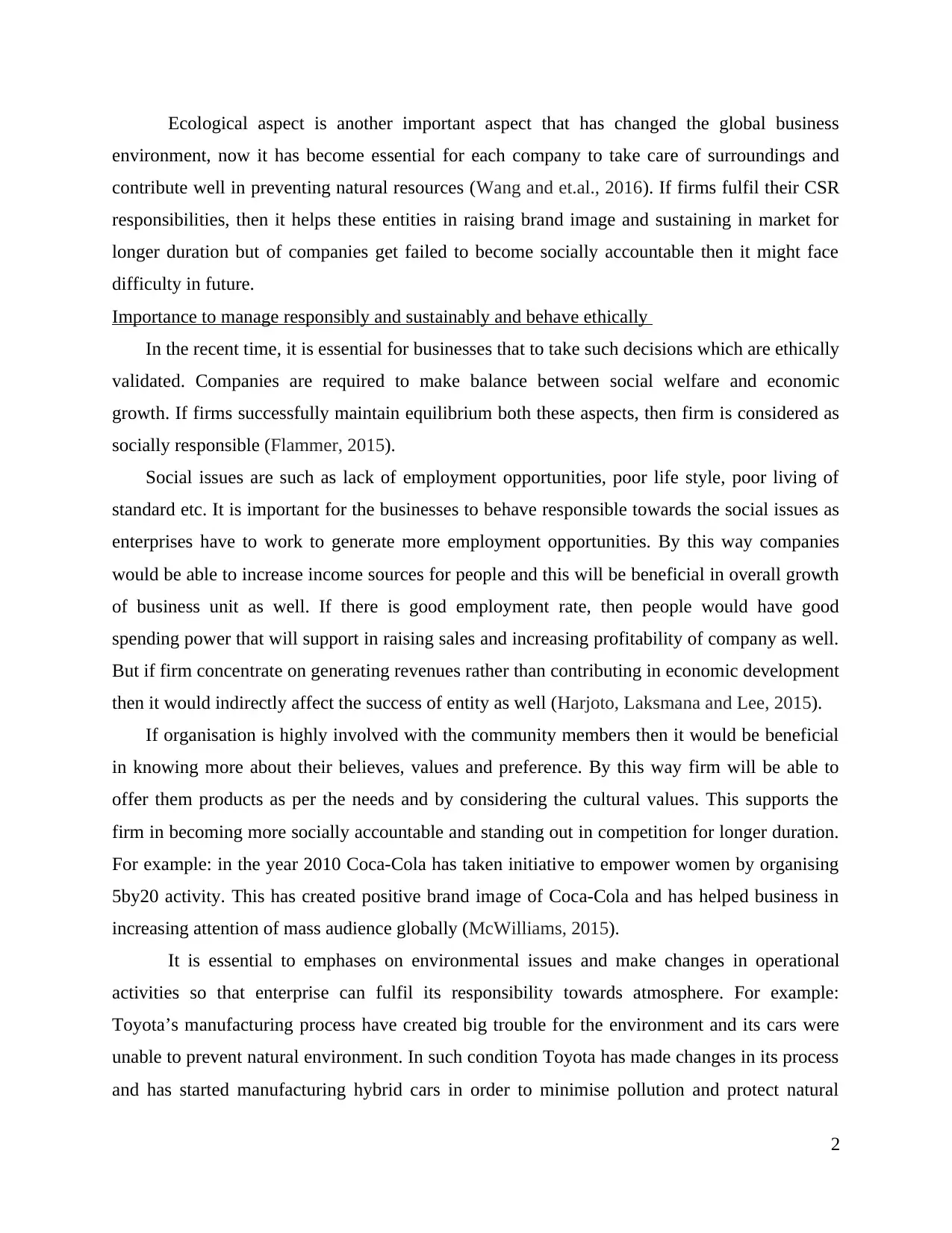
Ecological aspect is another important aspect that has changed the global business
environment, now it has become essential for each company to take care of surroundings and
contribute well in preventing natural resources (Wang and et.al., 2016). If firms fulfil their CSR
responsibilities, then it helps these entities in raising brand image and sustaining in market for
longer duration but of companies get failed to become socially accountable then it might face
difficulty in future.
Importance to manage responsibly and sustainably and behave ethically
In the recent time, it is essential for businesses that to take such decisions which are ethically
validated. Companies are required to make balance between social welfare and economic
growth. If firms successfully maintain equilibrium both these aspects, then firm is considered as
socially responsible (Flammer, 2015).
Social issues are such as lack of employment opportunities, poor life style, poor living of
standard etc. It is important for the businesses to behave responsible towards the social issues as
enterprises have to work to generate more employment opportunities. By this way companies
would be able to increase income sources for people and this will be beneficial in overall growth
of business unit as well. If there is good employment rate, then people would have good
spending power that will support in raising sales and increasing profitability of company as well.
But if firm concentrate on generating revenues rather than contributing in economic development
then it would indirectly affect the success of entity as well (Harjoto, Laksmana and Lee, 2015).
If organisation is highly involved with the community members then it would be beneficial
in knowing more about their believes, values and preference. By this way firm will be able to
offer them products as per the needs and by considering the cultural values. This supports the
firm in becoming more socially accountable and standing out in competition for longer duration.
For example: in the year 2010 Coca-Cola has taken initiative to empower women by organising
5by20 activity. This has created positive brand image of Coca-Cola and has helped business in
increasing attention of mass audience globally (McWilliams, 2015).
It is essential to emphases on environmental issues and make changes in operational
activities so that enterprise can fulfil its responsibility towards atmosphere. For example:
Toyota’s manufacturing process have created big trouble for the environment and its cars were
unable to prevent natural environment. In such condition Toyota has made changes in its process
and has started manufacturing hybrid cars in order to minimise pollution and protect natural
2
environment, now it has become essential for each company to take care of surroundings and
contribute well in preventing natural resources (Wang and et.al., 2016). If firms fulfil their CSR
responsibilities, then it helps these entities in raising brand image and sustaining in market for
longer duration but of companies get failed to become socially accountable then it might face
difficulty in future.
Importance to manage responsibly and sustainably and behave ethically
In the recent time, it is essential for businesses that to take such decisions which are ethically
validated. Companies are required to make balance between social welfare and economic
growth. If firms successfully maintain equilibrium both these aspects, then firm is considered as
socially responsible (Flammer, 2015).
Social issues are such as lack of employment opportunities, poor life style, poor living of
standard etc. It is important for the businesses to behave responsible towards the social issues as
enterprises have to work to generate more employment opportunities. By this way companies
would be able to increase income sources for people and this will be beneficial in overall growth
of business unit as well. If there is good employment rate, then people would have good
spending power that will support in raising sales and increasing profitability of company as well.
But if firm concentrate on generating revenues rather than contributing in economic development
then it would indirectly affect the success of entity as well (Harjoto, Laksmana and Lee, 2015).
If organisation is highly involved with the community members then it would be beneficial
in knowing more about their believes, values and preference. By this way firm will be able to
offer them products as per the needs and by considering the cultural values. This supports the
firm in becoming more socially accountable and standing out in competition for longer duration.
For example: in the year 2010 Coca-Cola has taken initiative to empower women by organising
5by20 activity. This has created positive brand image of Coca-Cola and has helped business in
increasing attention of mass audience globally (McWilliams, 2015).
It is essential to emphases on environmental issues and make changes in operational
activities so that enterprise can fulfil its responsibility towards atmosphere. For example:
Toyota’s manufacturing process have created big trouble for the environment and its cars were
unable to prevent natural environment. In such condition Toyota has made changes in its process
and has started manufacturing hybrid cars in order to minimise pollution and protect natural
2
Paraphrase This Document
Need a fresh take? Get an instant paraphrase of this document with our AI Paraphraser
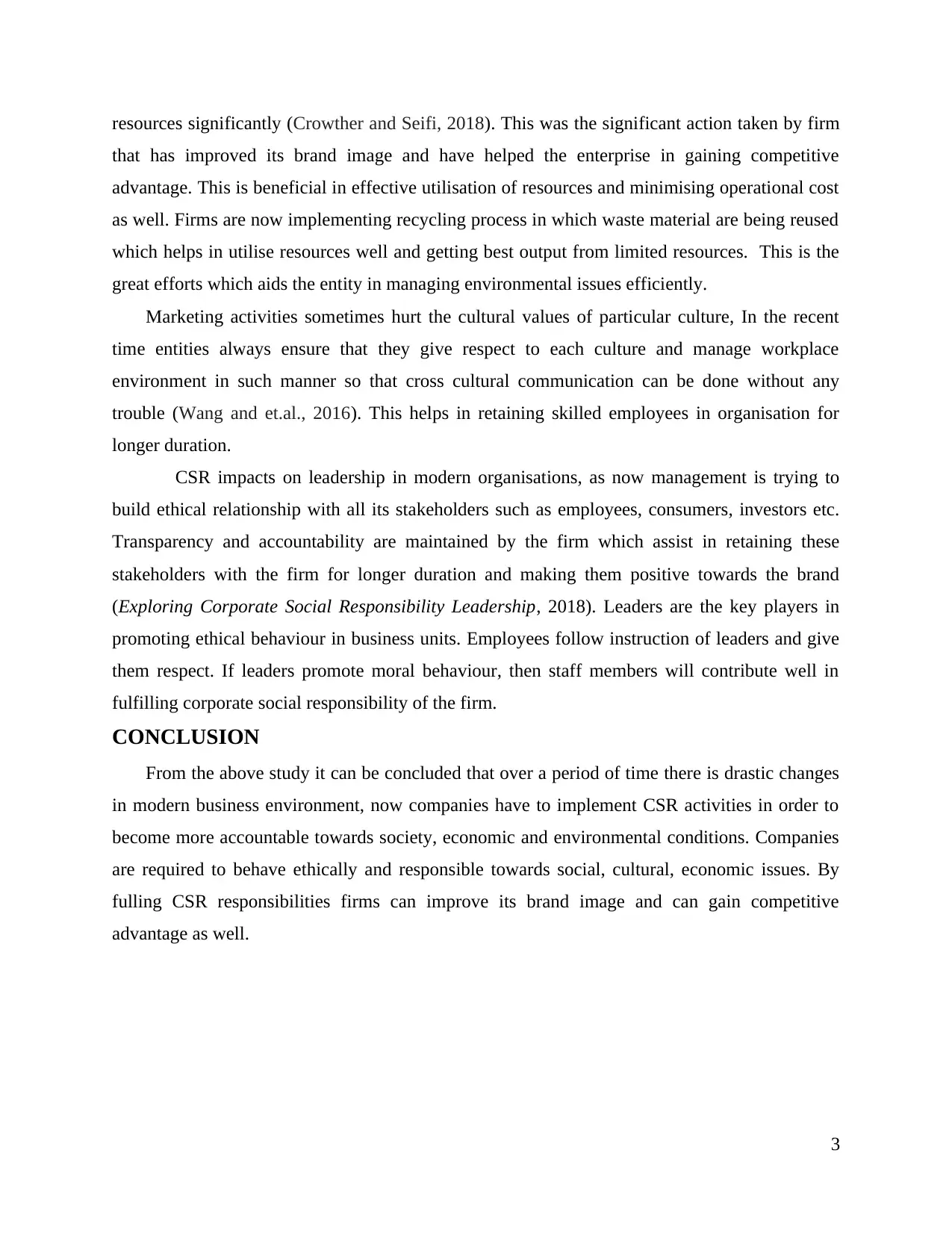
resources significantly (Crowther and Seifi, 2018). This was the significant action taken by firm
that has improved its brand image and have helped the enterprise in gaining competitive
advantage. This is beneficial in effective utilisation of resources and minimising operational cost
as well. Firms are now implementing recycling process in which waste material are being reused
which helps in utilise resources well and getting best output from limited resources. This is the
great efforts which aids the entity in managing environmental issues efficiently.
Marketing activities sometimes hurt the cultural values of particular culture, In the recent
time entities always ensure that they give respect to each culture and manage workplace
environment in such manner so that cross cultural communication can be done without any
trouble (Wang and et.al., 2016). This helps in retaining skilled employees in organisation for
longer duration.
CSR impacts on leadership in modern organisations, as now management is trying to
build ethical relationship with all its stakeholders such as employees, consumers, investors etc.
Transparency and accountability are maintained by the firm which assist in retaining these
stakeholders with the firm for longer duration and making them positive towards the brand
(Exploring Corporate Social Responsibility Leadership, 2018). Leaders are the key players in
promoting ethical behaviour in business units. Employees follow instruction of leaders and give
them respect. If leaders promote moral behaviour, then staff members will contribute well in
fulfilling corporate social responsibility of the firm.
CONCLUSION
From the above study it can be concluded that over a period of time there is drastic changes
in modern business environment, now companies have to implement CSR activities in order to
become more accountable towards society, economic and environmental conditions. Companies
are required to behave ethically and responsible towards social, cultural, economic issues. By
fulling CSR responsibilities firms can improve its brand image and can gain competitive
advantage as well.
3
that has improved its brand image and have helped the enterprise in gaining competitive
advantage. This is beneficial in effective utilisation of resources and minimising operational cost
as well. Firms are now implementing recycling process in which waste material are being reused
which helps in utilise resources well and getting best output from limited resources. This is the
great efforts which aids the entity in managing environmental issues efficiently.
Marketing activities sometimes hurt the cultural values of particular culture, In the recent
time entities always ensure that they give respect to each culture and manage workplace
environment in such manner so that cross cultural communication can be done without any
trouble (Wang and et.al., 2016). This helps in retaining skilled employees in organisation for
longer duration.
CSR impacts on leadership in modern organisations, as now management is trying to
build ethical relationship with all its stakeholders such as employees, consumers, investors etc.
Transparency and accountability are maintained by the firm which assist in retaining these
stakeholders with the firm for longer duration and making them positive towards the brand
(Exploring Corporate Social Responsibility Leadership, 2018). Leaders are the key players in
promoting ethical behaviour in business units. Employees follow instruction of leaders and give
them respect. If leaders promote moral behaviour, then staff members will contribute well in
fulfilling corporate social responsibility of the firm.
CONCLUSION
From the above study it can be concluded that over a period of time there is drastic changes
in modern business environment, now companies have to implement CSR activities in order to
become more accountable towards society, economic and environmental conditions. Companies
are required to behave ethically and responsible towards social, cultural, economic issues. By
fulling CSR responsibilities firms can improve its brand image and can gain competitive
advantage as well.
3
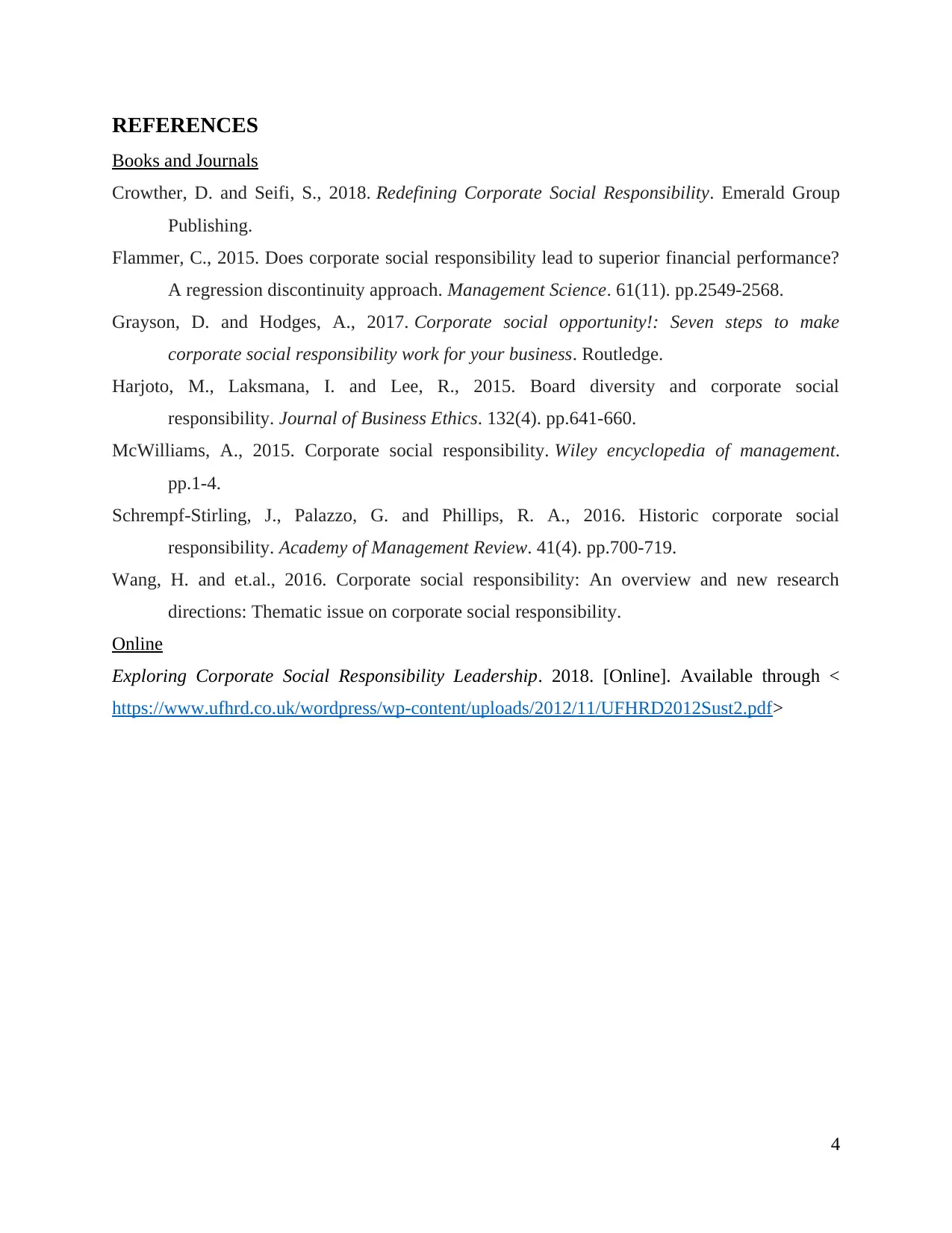
REFERENCES
Books and Journals
Crowther, D. and Seifi, S., 2018. Redefining Corporate Social Responsibility. Emerald Group
Publishing.
Flammer, C., 2015. Does corporate social responsibility lead to superior financial performance?
A regression discontinuity approach. Management Science. 61(11). pp.2549-2568.
Grayson, D. and Hodges, A., 2017. Corporate social opportunity!: Seven steps to make
corporate social responsibility work for your business. Routledge.
Harjoto, M., Laksmana, I. and Lee, R., 2015. Board diversity and corporate social
responsibility. Journal of Business Ethics. 132(4). pp.641-660.
McWilliams, A., 2015. Corporate social responsibility. Wiley encyclopedia of management.
pp.1-4.
Schrempf-Stirling, J., Palazzo, G. and Phillips, R. A., 2016. Historic corporate social
responsibility. Academy of Management Review. 41(4). pp.700-719.
Wang, H. and et.al., 2016. Corporate social responsibility: An overview and new research
directions: Thematic issue on corporate social responsibility.
Online
Exploring Corporate Social Responsibility Leadership. 2018. [Online]. Available through <
https://www.ufhrd.co.uk/wordpress/wp-content/uploads/2012/11/UFHRD2012Sust2.pdf>
4
Books and Journals
Crowther, D. and Seifi, S., 2018. Redefining Corporate Social Responsibility. Emerald Group
Publishing.
Flammer, C., 2015. Does corporate social responsibility lead to superior financial performance?
A regression discontinuity approach. Management Science. 61(11). pp.2549-2568.
Grayson, D. and Hodges, A., 2017. Corporate social opportunity!: Seven steps to make
corporate social responsibility work for your business. Routledge.
Harjoto, M., Laksmana, I. and Lee, R., 2015. Board diversity and corporate social
responsibility. Journal of Business Ethics. 132(4). pp.641-660.
McWilliams, A., 2015. Corporate social responsibility. Wiley encyclopedia of management.
pp.1-4.
Schrempf-Stirling, J., Palazzo, G. and Phillips, R. A., 2016. Historic corporate social
responsibility. Academy of Management Review. 41(4). pp.700-719.
Wang, H. and et.al., 2016. Corporate social responsibility: An overview and new research
directions: Thematic issue on corporate social responsibility.
Online
Exploring Corporate Social Responsibility Leadership. 2018. [Online]. Available through <
https://www.ufhrd.co.uk/wordpress/wp-content/uploads/2012/11/UFHRD2012Sust2.pdf>
4
⊘ This is a preview!⊘
Do you want full access?
Subscribe today to unlock all pages.

Trusted by 1+ million students worldwide
1 out of 6
Related Documents
Your All-in-One AI-Powered Toolkit for Academic Success.
+13062052269
info@desklib.com
Available 24*7 on WhatsApp / Email
![[object Object]](/_next/static/media/star-bottom.7253800d.svg)
Unlock your academic potential
Copyright © 2020–2026 A2Z Services. All Rights Reserved. Developed and managed by ZUCOL.





